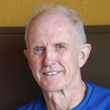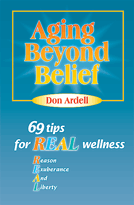 Don Ardell’s tips for aging well are from his book Aging Beyond Belief, 69 tips for REAL Wellness. REAL wellness stands for Reason, Exuberance And Liberty. Don says you can’t buy pills or treatments for REAL wellness−it’s a mindset and lifestyle you control. It’s never to early to let Reason, Exuberance and Liberty be your guide…these tips are for folks of any age. Enjoy.
Don Ardell’s tips for aging well are from his book Aging Beyond Belief, 69 tips for REAL Wellness. REAL wellness stands for Reason, Exuberance And Liberty. Don says you can’t buy pills or treatments for REAL wellness−it’s a mindset and lifestyle you control. It’s never to early to let Reason, Exuberance and Liberty be your guide…these tips are for folks of any age. Enjoy.
TIP 5
Nutrition – the Heart of the Matter
Adopt two simple nutritional goals and work to realize both
This tip is supported by research done at the Agriculture and Health and Human Services Departments. The two nutritional goals are: 1) Eat fruits and vegetables on at least three separate occasions spaced throughout the day; and 2) Consume at least two cups of fruit and three cups of vegetables daily.
Another study published in the journal Neurology (10/24/2006), based on a six-year research project involving 4000 seniors, hinted strongly that it’s never too late to gain a mental edge in this fashion. Two daily servings of vegetables—that’s all it takes. What a deal.
Veggies are much cheaper than drugs and doctor visits. Besides, nobody ever got smarter medicating or seeing doctors. The seniors study just mentioned, done at the Rush Center for Healthy Aging in Chicago, suggests the two-serving daily fix slows cognitive mental declines by as much as 40 percent. This is judged the equivalent of a five-year age discount! There are not many ways to drop five years of aging effects—don’t pass up such a deal!
Vegetables, particularly those in the leafy green category, provide such brain benefits because of their antioxidant compounds, such as vitamin E, flavonoids and carotenoids. What’s more, the absorption of these compounds is enhanced if they are prepared using olive or vegetable oils, or other poly or mono-unsaturated fats.
Such high consumption levels will ensure that you get loads of phytonutrients—great as antioxidants that inhibit free radical cell damages and helpful, as well, in weight control. At present, 90 percent of the US population does not realize this intake standard. This partially accounts for the fact that two-thirds of Americans are overweight and 90 million suffer from chronic diseases. Naturally, our individual needs vary, depending on our exercise levels, age and sex. To personalize this tip in accord with your situation, go to www.mypyramid.gov. (For details about top-rated fruits and veggies, see “More Reasons to Eat Your Veggies,” Wall Street Journal, 7/25/06, D1 and D3).
This tip is offered despite the general rule that you should be suspicious of claims for one specific food or another. This tip is not for a single food, but two classes of food. Still, it is useful to note that it is wise to reserve judgments. Always allow time for your critical thinking talents to come into play. Let’s say someone insists that his product will increase your energy, shrink your derriere and/or grow hair on your head. What to do? My advice—be respectful and kind but don’t agree or buy anything. Be skeptical. Assuming you were even mildly interested, ask for evidence. Insist that it be from a disinterested third party—and take your time before deciding.
 Donald B. Ardell was a pioneer in the Wellness movement. He wrote High Level Wellness: An Alternative to Doctors, Drugs, and Disease, first published in 1976 by Rodale Press, with editions over the years by Bantam Books and Ten-Speed Press. Since then Don has written a dozen additional wellness books, including Die Healthy (with Grant Donovan), 14 Days to Wellness and most recently, Aging Beyond Belief.
Donald B. Ardell was a pioneer in the Wellness movement. He wrote High Level Wellness: An Alternative to Doctors, Drugs, and Disease, first published in 1976 by Rodale Press, with editions over the years by Bantam Books and Ten-Speed Press. Since then Don has written a dozen additional wellness books, including Die Healthy (with Grant Donovan), 14 Days to Wellness and most recently, Aging Beyond Belief.

